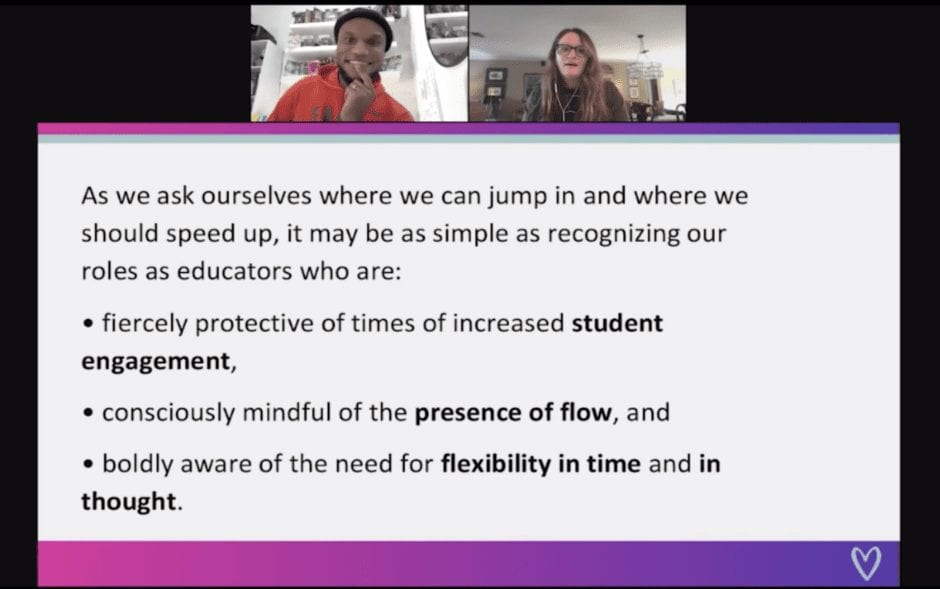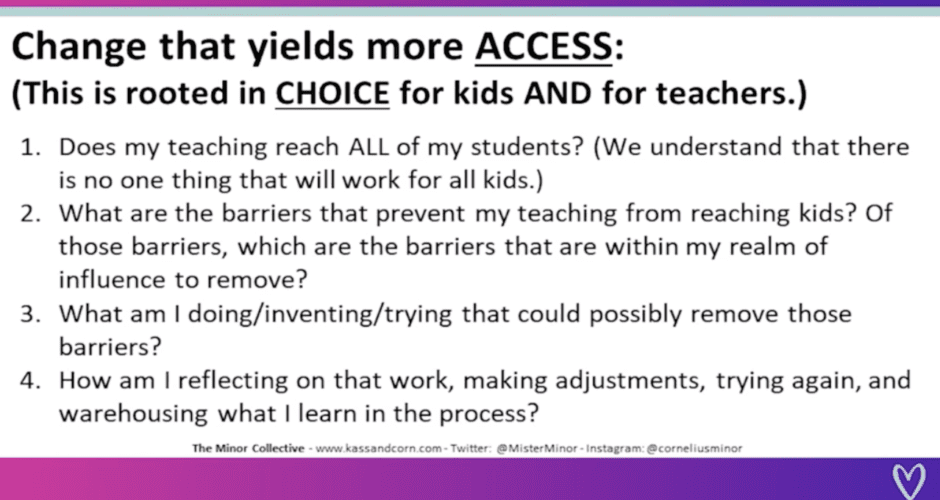Equity in Education, Even During the Pandemic
As the COVID-19 crisis has forced schools to close their buildings and move online, inequities in access to technology, books, and even food have become more apparent. Still, there are ways educators can continue to support the learning needs of their full range of students and make the education they provide more equitable.
During a recent edWebinar sponsored by Scholastic Education, Digital Solutions, Cornelius Minor, a Brooklyn-based educator and staff developer, and Dr. Jennifer Williams, a professor at St. Leo University’s College of Education, identified ways that teachers can increase their understanding of equity issues that may affect learning needs, in order to respond with effective solutions.
Progressing to a “Better Normal”
Acknowledging the widespread desire to “return to normal,” Cornelius pointed out that would also result in the continuation of recent trends such as the underrepresentation of females in science and technology, and the high rate of school suspensions for students of color. He then explained specific techniques that educators can use now to improve outcomes for students who are at disadvantages due to factors such as race, economic class, and language proficiency.
In particular, the current need to reinvent the way educators teach provides an opportunity to adapt rules, policies, and customs that can lead to inequitable outcomes for specific groups of students. Pointing out that some children are active learners, and that educators need to think about approaches that will support their achievement, Cornelius mentioned a recent experience in which young students were asked to sit still during a 20-minute read aloud.
Knowing that some students have no difficulty doing that, but it can be challenging for others, Cornelius explained that he had created opportunities for students to respond through movement and talking, which can improve the academic and behavioral performance of students who need to engage in active and social comprehension.
Cornelius also cited a recent response to data on secondary students at an urban school, which found that many girls were not attending after-school sessions designed to improve their performance on chemistry tests. Interviews with girls who did not attend revealed that because the sessions were from 3 to 6 PM during February, a number of parents felt it would not be safe for the girls to walk home from the sessions in the dark and therefore stopped them from attending, so the time was changed and attendance improved.
Finding Solutions in Time
Jennifer noted that many teachers are realizing how adaptive and creative they can be due to the current circumstances, and the same understanding can be applied to finding solutions for diverse students’ learning needs. This should not be seen as a quick and easy way to achieve perfection, but rather a process of invention and successive iterations with the understanding that work on equity is a work in progress.
Many teachers have traditionally found time management to be a challenging issue, and now may be under even greater time pressure as they adapt to teaching during the pandemic, so Jennifer recommended focusing on three key questions in regard to time: when to “jump in,” when to slow down, and when to speed up.
Making sure that diverse students’ interests and values are represented should be a key consideration in regard to jumping in. Teachers need to be able to pivot and respond, especially to distress signals, but there should also be a proactive approach to considering how best to engage different students in the learning process, and to make sure they all feel noticed and have their achievements recognized.
As for when to slow down or speed up, Jennifer emphasized the importance of being mindful of the presence of “flow,” and protecting periods of active and engaged learning so that a rigid schedule does not become a barrier to effective education. This requires flexibility in regard to time and thought, and may also require more communication with administrators, parents, or others so that they understand the educational value of what is happening.
In closing, Cornelius cited the importance of “academic pluralism,” with students being able to learn and demonstrate mastery through multiple means of engagement, representation, action, and expression.
This edWeb broadcast was sponsored by Scholastic Education, Digital Solutions.
This article was modified and published by eSchool News.
About the Presenters
Cornelius Minor is a Brooklyn-based teacher and staff developer. He works with teachers, school leaders, and leaders of community-based organizations to support equitable literacy reform in cities across the globe. He has been featured in Education Week, Brooklyn Magazine, and Teaching Tolerance Magazine. He has partnered with The Teachers College Reading and Writing Project, NYC DOE, ILA, and Lesley University’s Center for Reading Recovery and Literacy Collaborative. Whether working with educators and kids in Los Angeles, Seattle, or New York City, Cornelius uses his love for technology, hip-hop, and social media to bring communities together. As a teacher, Cornelius draws not only on his years teaching middle school in the Bronx and Brooklyn, but also on time spent skateboarding, shooting hoops, and working with young people.
Dr. Jennifer Williams is a professor at Saint Leo University’s College of Education and the co-founder and executive director of Take Action Global, an organization designed to inspire change by providing opportunities for students around the world to take action on social good causes through education. Recognized as a transformational leader in education, Dr. Jennifer Williams has dedicated herself for nearly 25 years to the field of education through her roles as an education activist, professor, school administrator, literacy specialist, and classroom teacher. She speaks, writes, and consults on practices that develop global perspectives and social good through creative uses of technology, and her research interests include innovations in teaching and learning, equity and diversity in education, and social action. Jennifer is inspired every day by teachers and students that are catalysts for making the world a better place!
Join the Community
Leadership 3.0 is a free professional learning community on edWeb.net where school and district leaders collaborate on innovative strategies to help teachers grow professionally, advance student learning, and improve communications with all stakeholders.
At Scholastic, we believe that the development of robust literacy skills is at the very heart of empowering children to thrive in school and in life. That’s why we create literacy solutions that support the whole child—in the classroom, at home, and in the community. From transformative, research-based literacy instruction, to expert professional development, and groundbreaking family & community engagement, we are with you every step of the way on the path to literacy.





Comments are closed.